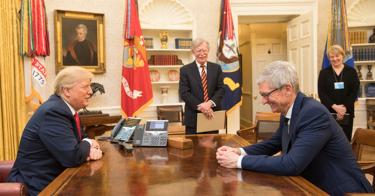One of the problems with tariffs—and there are many—is that well-connected firms regularly win concessions that give them special advantages over others.
Apple, the tech giant, is a perfect example of that phenomenon.
President Donald Trump made an 11th-hour decision to spare the Apple Watch, along with certain other “data-transmission devices,” from the list of $200 billion in Chinese imports subject to tariffs imposed on Sept. 24.
Interestingly, the decision came a week after Apple announced its newest generation of the smartwatch, and almost a month after Apple CEO Tim Cook paid the president a visit at his New Jersey golf club.
In response to the tariffs imposed on Chinese imports, many firms have had to increase prices, reduce investment, or lay off workers.
In fact, Apple stated that its own “concern with these tariffs is that the U.S. will be hardest hit, and that will result in lower growth and competitiveness, and higher prices for U.S. consumers.”
Yet, somehow, Cook won concessions for key Apple products.
This isn’t the first time Cook was able to secure his company an exemption, however.
During the first round of tariff negotiations, in June, the iPhone and other consumer electronics joined the slate of other goods for fresh tariffs. Despite being China’s most valuable export category to the U.S., key electronics (including the iPhone) were notably spared at the last minute.
Not every business has been as lucky as Apple, even though the logic—that tariffs harm domestic consumers and, therefore, domestic companies—surely applies to others.
Trump has said that small-business owners are the “engine of American prosperity,” though his trade policies have been the engineering equivalent of pouring water in the gas tank.
Tariffs place additional burdens on domestic firms, who must pay more for input materials, and in response, must raise prices to their customers.
As is evident with Apple, large companies with political sway have the ability to get key exemptions, while small businesses are left without protection from tariffs’ consequences.
For example, Mid Continent Nail Corp., a nail manufacturer in Poplar Bluff, Missouri, has lost 200 employees, seen a 25 percent increase in costs, and raised prices by 19 percent.
Other small businesses—such as Howard-McCray, Duncanson Growers, Highlands Family Farm, and Schaefer’s—have argued that imports are integral to their businesses and that tariffs have increased their production costs.
Apple is a massive player in the American economy and recently announced major U.S. investments—$350 billion, a new headquarters, and 20,000 jobs—in response to Trump’s tax cuts.
Cook has worked closely with the president and advised him of the disruptions that would result from tariffs on consumer products.
Larry Kudlow, the top White House economic adviser, has described a symbiotic relationship between the Apple CEO and the administration. “He was very helpful in making some suggestions, and I might also add he loves the tax cut and tax reform,” Kudlow told CNBC after an April meeting in the West Wing.
It makes sense, then, that the president would protect Apple and other tech firms from the growth-slowing consequences of his tariffs.
However, many small businesses are losing out because of those reckless policies, as they do not have a line to the president’s ear or the political capital to protect themselves.
Tariffs are an ineffective tool to combat trade abuses because they harm the people at home and disrupt the supply chains that American businesses rely on.
While often referred to as a “protectionist” policy, tariffs in fact expose many small firms to new risks and higher costs of materials.
Apple has effectively dodged tariffs on its products so far, despite being a prime target in Trump’s mission to bring manufacturing back to the U.S.
Apple is no doubt a large player in the economy, and the direct effect of taxing them may be more apparent than taxing a smaller-scale enterprise, such as a Missouri nail manufacturer.
But giving Apple a sweetheart deal while sticking small businesses with the bill represents exactly what’s wrong with cronyism in U.S. politics.
This piece originally appeared in The Daily Signal



